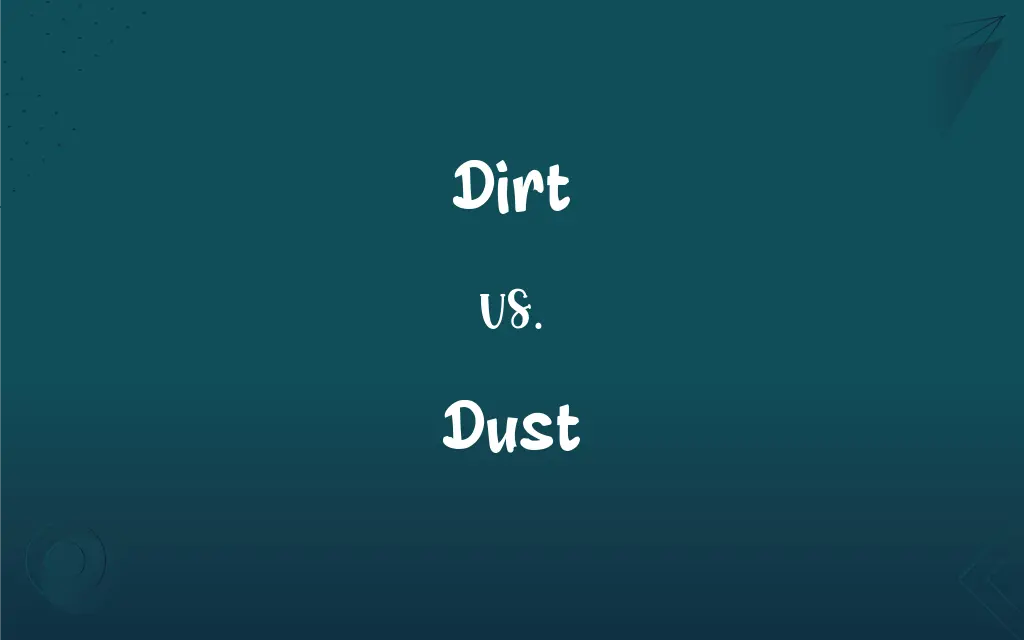Dirt vs. Dust: What's the Difference?
By Harlon Moss || Updated on May 23, 2024
Dirt refers to soil or earth, typically found on the ground, while dust consists of fine, dry particles from various sources, often found in the air or on surfaces.

Key Differences
Dirt is composed of soil, mud, or earth and is usually found on the ground or surfaces that come into contact with the ground. It is a broader term encompassing larger particles and organic matter. Dust, on the other hand, consists of fine, dry particles that can come from various sources, including soil, dead skin cells, fabric fibers, and more. Dust is typically found indoors on surfaces like furniture, floors, and electronics, as well as floating in the air.
In cleaning contexts, dirt is often more visible and requires more effort to remove, usually involving washing or scrubbing. Dust, being finer, is usually removed with dusters, cloths, or vacuum cleaners designed to capture small particles without dispersing them back into the air.
Dirt is commonly associated with outdoor environments, while dust is more frequently an indoor concern. For instance, children playing in the garden might get dirty, while a house left uncleaned for a while will gather dust.
In terms of impact on health, dirt generally poses less risk unless it carries harmful bacteria or chemicals, whereas dust can aggravate allergies and respiratory issues due to its fine particles and potential to carry allergens like pollen or pet dander.
While dirt and dust share some similarities as unwanted materials, they differ significantly in composition, location, and the methods required for their removal.
ADVERTISEMENT
Comparison Chart
Composition
Soil, mud, organic matter
Fine particles from various sources
Common Location
Outdoors, on the ground
Indoors, on surfaces, in the air
Particle Size
Larger, visible particles
Fine, often microscopic particles
Cleaning Method
Washing, scrubbing
Dusting, vacuuming
Health Impact
Generally less harmful, can carry bacteria
Can aggravate allergies, respiratory issues
ADVERTISEMENT
Dirt and Dust Definitions
Dirt
Soil or earth, often found on the ground.
The children came home with dirt all over their shoes.
Dust
Fine, dry particles from various sources.
The bookshelf was covered in a layer of dust.
Dirt
Material that makes something unclean.
She wiped the dirt off the countertop.
Dust
Particles that accumulate indoors from skin, fibers, etc.
He sneezed from the dust in the old attic.
Dirt
Loose soil used in gardening.
He planted the flowers in rich, dark dirt.
Dust
Powdery earth or other substances in the air.
Dust swirled in the sunlight streaming through the window.
Dirt
Earth or soil.
Dust
Fine, dry particles of matter.
Dirt
A filthy or soiling substance, such as mud or dust.
Dust
A cloud of fine, dry particles.
Dirt
Excrement.
Dust
Particles of matter regarded as the result of disintegration
Fabric that had fallen to dust over the centuries.
Dirt
A squalid or filthy condition.
Dust
Earth, especially when regarded as the substance of the grave
"ashes to ashes, dust to dust" (Book of Common Prayer).
Dirt
One that is mean, contemptible, or vile.
Dust
The surface of the ground.
Dirt
Obscene language or subject matter.
Dust
A debased or despised condition.
Dirt
Malicious or scandalous gossip.
Dust
Something of no worth.
Dirt
Information that embarrasses or accuses.
Dust
Chiefly British Rubbish readied for disposal.
Dirt
Unethical behavior or practice; corruption.
Dust
Confusion; agitation; commotion
Won't go back in until the dust settles.
Dirt
Material, such as gravel or slag, from which metal is extracted in mining.
Dust
To remove dust from by wiping, brushing, or beating
Dust the furniture.
Dirt
Soil or earth.
Dust
To sprinkle with a powdery substance
Dusted the cookies with sugar.
Dust crops with fertilizer.
Dirt
A stain or spot (on clothes etc); any foreign substance that worsens appearance.
Dust
To apply or strew in fine particles
Dusted talcum powder on my feet.
Dirt
Previously unknown facts, or the invented "facts", about a person.
The reporter uncovered the dirt on the businessman by going undercover.
Dust
(Baseball) To deliver a pitch so close to (the batter) as to make the batter back away.
Dirt
(figurative) Meanness; sordidness.
Dust
To clean by removing dust.
Dirt
(mining) In placer mining, earth, gravel, etc., before washing.
Dust
To cover itself with dry soil or other particulate matter. Used of a bird.
Dirt
Freckles
Dust
Fine particles
Dirt
To make foul or filthy; soil; befoul; dirty
Dust
(uncountable) Fine, dry particles of matter found in the air and covering the surface of objects, typically consisting of soil lifted up by the wind, pollen, hair, etc.
Dirt
Any foul of filthy substance, as excrement, mud, dust, etc.; whatever, adhering to anything, renders it foul or unclean; earth; as, a wagonload of dirt.
Whose waters cast up mire and dirt.
Dust
Submicron particles in outer space, largely silicates and carbon compounds, that contribute greatly to extinction at visible wavelengths.
Dirt
Meanness; sordidness.
Honors . . . thrown away upon dirt and infamy.
Dust
(obsolete) A single particle of earth or other material.
Dirt
In placer mining, earth, gravel, etc., before washing.
Dust
(countable) The act of cleaning by dusting.
Dirt
To make foul of filthy; to dirty.
Dust
The earth, as the resting place of the dead.
Dirt
The part of the earth's surface consisting of humus and disintegrated rock
Dust
The earthy remains of bodies once alive; the remains of the human body.
Dirt
The state of being covered with unclean things
Dust
(figurative) Something worthless.
Dirt
Obscene terms for feces
Dust
(figurative) A low or mean condition.
Dirt
Disgraceful gossip about the private lives of other people
Dust
Cash; money (in reference to gold dust).
Dirt
(of roads) not leveled or drained; unsuitable for all year travel
Dust
(colloquial) A disturbance or uproar.
To raise, or kick up, a dust
Dirt
Mud or grime, often wet.
The car tires were caked in dirt after driving through the field.
Dust
(mathematics) A totally disconnected set of points with a fractal structure.
Dirt
Unwanted material or refuse.
The construction site was covered in dirt and debris.
Dust
(transitive) To remove dust from.
The cleaning lady needs a stool to dust the cupboard.
Dust
(intransitive) To remove dust; to clean by removing dust.
Dusting always makes me cough.
Dust
(intransitive) Of a bird, to cover itself in sand or dry, dusty earth.
Dust
(transitive) To spray or cover something with fine powder or liquid.
The mother dusted her baby's bum with talcum powder.
Dust
To leave; to rush off.
Dust
To reduce to a fine powder; to levigate.
Dust
(slang) To kill.
Dust
Fine, dry particles of earth or other matter, so comminuted that they may be raised and wafted by the wind; that which is crumbled to minute portions; fine powder; as, clouds of dust; bone dust.
Dust thou art, and unto dust shalt thou return.
Stop! - for thy tread is on an empire's dust.
Dust
A single particle of earth or other matter.
Dust
The earth, as the resting place of the dead.
For now shall sleep in the dust.
Dust
The earthy remains of bodies once alive; the remains of the human body.
And you may carve a shrine about my dust.
Dust
Figuratively, a worthless thing.
And by the merit of vile gold, dross, dust.
Dust
Figuratively, a low or mean condition.
[God] raiseth up the poor out of the dust.
Dust
Gold dust
Dust
To free from dust; to brush, wipe, or sweep away dust from; as, to dust a table or a floor.
Dust
To sprinkle with dust.
Dust
To reduce to a fine powder; to levigate.
Dust
Fine powdery material such as dry earth or pollen that can be blown about in the air;
The furniture was covered with dust
Dust
The remains of something that has been destroyed or broken up
Dust
Free microscopic particles of solid material;
Astronomers say that the empty space between planets actually contains measurable amounts of dust
Dust
Remove the dust from;
Dust the cabinets
Dust
Rub the dust over a surface so as to blur the outlines of a shape;
The artist dusted the charcoal drawing down to a faint image
Dust
Cover with a light dusting of a substance;
Dust the bread with flour
Dust
Distribute loosely;
He scattered gun powder under the wagon
Dust
Fine particles of any material.
The flour turned to dust as it spilled on the counter.
Dust
Matter that settles on surfaces from the air.
She used a cloth to wipe the dust off the table.
FAQs
Where does dust commonly accumulate?
Dust accumulates indoors on surfaces like furniture, floors, and electronics, as well as in the air.
Where is dirt commonly found?
Dirt is typically found outdoors on the ground or surfaces in contact with the ground.
What are the common sources of dust?
Dust can come from soil, dead skin cells, fabric fibers, and other fine particles.
What is dirt mainly composed of?
Dirt is mainly composed of soil, mud, and organic matter.
What is the primary difference between dirt and dust?
Dirt is composed of soil or earth, while dust consists of fine, dry particles from various sources.
Can dirt carry harmful bacteria?
Yes, dirt can carry harmful bacteria or chemicals, especially if contaminated.
Is dirt or dust more likely to become airborne?
Dust is more likely to become airborne due to its fine particle size.
Does dust pose health risks?
Yes, dust can aggravate allergies and respiratory issues.
What are typical cleaning methods for dust?
Dust is usually removed with dusters, cloths, or vacuum cleaners.
Which is harder to clean, dirt or dust?
Dirt is often harder to clean as it may require washing or scrubbing, while dust can be removed with dusters or vacuum cleaners.
Is dirt generally found indoors?
Dirt is less common indoors and usually results from outdoor activities.
Can dirt become dust?
Yes, when dirt dries and breaks into fine particles, it can become part of dust.
How does dirt affect outdoor activities?
Dirt can make surfaces muddy and messy, affecting outdoor activities.
What is a common household tool for dust removal?
A common household tool for dust removal is a vacuum cleaner with a HEPA filter.
What are typical cleaning methods for dirt?
Typical cleaning methods for dirt include washing and scrubbing.
Can dust include particles from dirt?
Yes, dust can include fine particles from dirt along with other sources.
Why is dust more problematic for allergies?
Dust can carry allergens like pollen, pet dander, and dust mites.
How does regular cleaning impact dirt and dust?
Regular cleaning helps prevent the buildup of both dirt and dust, maintaining a cleaner environment.
Is dust more of an indoor or outdoor concern?
Dust is primarily an indoor concern.
How does dust affect indoor air quality?
Dust can reduce indoor air quality and contribute to respiratory issues.
About Author
Written by
Harlon MossHarlon is a seasoned quality moderator and accomplished content writer for Difference Wiki. An alumnus of the prestigious University of California, he earned his degree in Computer Science. Leveraging his academic background, Harlon brings a meticulous and informed perspective to his work, ensuring content accuracy and excellence.































































